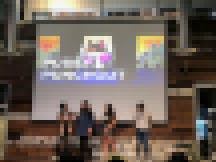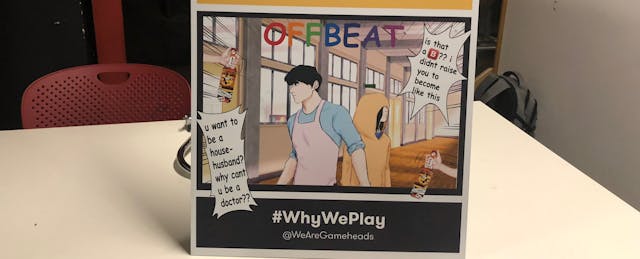A cat out to get revenge against a fraternity. An Asian-American man who refuses to live up to stereotypes, seeking instead to become a career house husband. A young wizard seeking a place where she can fit in.
Such were the unique games built by students and put on display last weekend at the fourth annual showcase for Gameheads, an Oakland-based nonprofit. Founded in 2014, the organization seeks to use video games to teach low-income and underrepresented youth the skills they need to succeed in the tech industry.
The organization offers three types programs: one for middle-school students, another for those ages 15 to 25 and an advanced track where technically proficient students can get paid to do contract work. Through these programs, Gameheads organizers aim to introduce students to a broad range of skills, such as coding, visual art, game theory and team building. Some of them are paired with mentors from the video game industry. Within the last year, Gameheads worked with about 350 students across the three programs.
Damon Packwood, Gameheads’ executive director and co-founder, thinks that collectively, the organization found its voice this year and embraced addressing uncomfortable topics. Packwood says video games have a stigma, and “you’re always trying to be a little bit careful in terms of what kind of games people make.”
In the past, he notes that the organization sometimes didn’t nurture some of the more unconventional ideas the students had, and nudged them towards something that might be easier to execute and present. In the last year and a half or so, however, Packwood says that the students pushed back. The country’s political climate had made a lot of them emotional, and they didn’t “want to be careful” when they created their games, he recalls.
“I said, ‘Look, if you guys want to make political statements, or if you want to make socio-political statements, I’m really just going to take off the shackles and [let] you guys just really go for it,’” Packwood says, adding that students also got to take a class last year where they learned how to “create a black video game... a Latino video game… an Asian American video game.”
And students did go for it. Political and socio-political themes were a common thread in many of the games, such as Pussy Punchout, which Packwood calls a “brilliant game” that “made all of the men in the program feel uncomfortable the entire summer.”
Here’s more about Pussy Punchout, and four other games that were in this year’s showcase.
Pussy Punchout

Inspired by the #MeToo movement, Pussy Punchout is about a cat named Pussy who is out to fight a fraternity after she realizes that they’ve taken the neighborhood cats against their will.
Veronica Guzman, the game designer, says the all-female group wanted to create a character who defined her own femininity. They also wanted to produce a “2D beat ’em up” game with a new perspective that challenges the representation of women in mainstream fighter games like Double Dragon, which often portray violence against women or depict them as in need of being rescued.
“We wanted to create a character that was not a damsel in distress,” Guzman says.
Offbeat

Offbeat wants to counter the Asian-American model minority myth, which portrays the group as being smart and submissive (among other stereotypes). To do so, the game focuses on an Asian-American man who has the unconventional goal of becoming a full-time house husband.
“There are stereotypes [about] us, like we’re really good at math, or we’re going into engineering, or we’re really conservative and quiet,” says the game’s artist, Mai-Khanh Pham.
In the turn-based, combat roleplaying game, the player can defy stereotypes through certain actions. “For example, let’s say your enemy’s like, ‘hey, do your homework,’ and then, your attack method is instead of punching them, you show them your really bad grades or something like that,” says Pham.
The Groundz

The Groundz is a game set in Oakland around 1993 where people can play “hood dodgeball.”
Why dodgeball? Xavier Ward-Domingo, the game designer, says the sports that are prevalent in video games are basketball, football, soccer and tennis. Dodgeball, however, rarely gets attention. The group wanted to give people a throwback to the feeling of being on the playground with no worries, having a good time with people they both know and don’t know.
“Dodgeball, it’s not like nobody plays,” Ward-Domingo says. “Everybody plays it throughout their life. And it’s really intense, and really fun. But when you get in your adult years, later on, you kind of forget about it.”
Behind the Mask

This game uses Iry, a wizard who’s searching for a place to fit in, to look at the fears those who identify as LGBTQ might have, such as worrying about social isolation due to their sexual orientation.
Iry is looking for a place she can fit in. She sees the world in color, but her mom sees the world in black and white. Her mom puts a cursed mask on Iry that forces her to see in black and white as well. Iry gets upset, and runs away, trying to reach a city where she can be herself.
Isaiah Johnson, the game’s project manager and programmer, says the group hopes players can walk away feeling better about themselves after playing the game.
Here’s Your Change!

How does gentrification affect communities? That’s the question this game, set in Oakland (where plenty of gentrification is happening), wants to answer. The game’s artist, Quyen-Vi Nguyen, says she and her teammates want to help players become more aware of how such changes impact local communities.
The main character of the game is a cashier who works at a liquor store in Oakland. As the store’s surroundings change (like an uptick in new construction), so too does the store. “The equipment that you use, the people that you interact with and the items that you sell will also change.”


